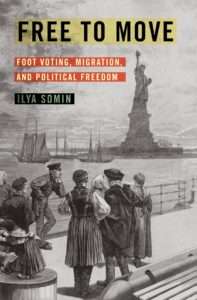Was it really just a few years ago that Americans started to agree that cops are too militarized, too in-your-face, and too likely to target people who can’t fight back? When legal experts warned that law is always violent and cautioned that we needed to think twice before making rules to be enforced by armed police?
For a brief time, we seemed to be taking the dangers of official force to heart. Then the pandemic came along, and we started repeating all the old mistakes. Now, rulers and the public are learning, again, that it’s unlikely you’ll make the world a better place by twisting people’s arms.
As COVID-19 spread across the country, and states and localities tightened the screws on what people were and were not allowed to do as part of efforts to limit viral transmission, politicians quickly went to their happy place: threatening people with violence for not doing what they’re told.
“My message to the Jewish community, and all communities, is this simple: the time for warnings has passed. I have instructed the NYPD to proceed immediately to summons or even arrest those who gather in large groups. This is about stopping this disease and saving lives. Period,” New York City Mayor Bill de Blasio threatened, infuriated that city residents weren’t marching in lockstep to his dictates.
His soulmate in Chicago, Mayor Lori Lightfoot, took a similar tone. “Don’t make us treat you like a criminal, but if you act like a criminal and you violate the law and refuse to do what’s necessary to save lives in the middle of a pandemic, we will take you to jail. Period,” she snarled in response to reports that some people continued to attend house parties.
Threats to arrest people for violating stay-at-home orders are especially ironic, given reports of rapid contagion in crowded jails and prisons. Mass imprisonment, it seems, isn’t a great public health tactic.
Even before unhygienic cells enter the picture, arrests of social-distancing scofflaws are perilous, too.
Cops across the country busted people for “social-distancing violations” including hanging out with friends, playing with their children in public parks, and failing to wear face masks. Police in Brooklyn “cuffed a mother and pinned her to the ground” because her mask was around her neck instead of over her nose and mouth.
Everybody is potentially on the receiving end of such treatment, but cops always lean most heavily on the people they prefer to target—often members of minority communities who are less able to push back.
“Of those arrested, 35 people were black, four were Hispanic and one was white,” The New York Times reported after a spate of especially brutal enforcement of rules allegedly intended (we were told) to protect people’s health in New York City.
All of this, every bit of it, could have been predicted by anybody paying attention to discussions about laws and law enforcement over the previous decade.
“On the opening day of law school, I always counsel my first-year students never to support a law they are not willing to kill to enforce,” Yale Law School’s Stephen L. Carter wrote in 2014 after New York City cops killed Eric Garner during a confrontation rooted in suspicion that he was illegally selling loose cigarettes. “I remind them that the police go armed to enforce the will of the state, and if you resist, they might kill you.”
Carter penned his piece as legal experts and journalists warned that the country has too many laws and too much law enforcement. An estimated 70 percent of Americans have committed a crime that could land them behind bars, Rutgers University’s Douglas Husak wrote in his 2008 book Overcriminalization: The Limits of the Criminal Law.
The cops hired to put all of those Americans behind bars were increasingly trained and equipped more like an army of occupation than like keepers of the peace and are deployed accordingly, as former Reason staffer Radley Balko pointed out in Rise of the Warrior Cop: The Militarization of America’s Police Forces.
“We can see cops stopping and arresting people, roughing people up, and administering street justice. We think, ‘Good. They’re getting the bad guys off the streets,'” Balko commented at the 2017 Reason Media Awards ceremony. “What we don’t see: The orders from mayors and senior officials in cities like Baltimore, St. Louis, and Chicago for police to initiate mass arrests, usually for petty offenses, sometimes for no offense at all.”
But we are seeing that with a vengeance now, in terms of arrests of “bad guys” guilty of failing to put a bit of fabric over their faces, or of spending time with friends in defiance of edicts to the contrary. Of illicitly reopening businesses they hope to save, or of venturing out for sunshine and open air when politicians have commanded that they stay confined to their homes. In the name of public health, of limiting contagion, and saving lives, government issues edicts to be enforced by those who “go armed to enforce the will of the state.”
That turns out to be not so terribly health-friendly, some officials belatedly concede.
“What we’ve been doing is we really are encouraging education and voluntary compliance,” Seattle Police Chief Carmen Best said last week after discussing the risks of jamming people into jail cells where they’re likely to get infected. “But we also know that we can’t arrest our way out of a pandemic.”
“Absent a serious danger to the public, NYPD will not take enforcement actions for failing to wear face coverings,” Mayor Bill de Blasio announced after a flurry of videos of people having their health protected by cops grinding their faces into concrete. This, just weeks after he threatened mass arrests.
That’s a welcome, though hardly universal, reversal among government officials whose go-to reaction is always to punish dissenters and force compliance with rules, even when that leads to a chain of worsening consequences. Maybe this time the contrast was too great between public health goals and decidedly unhealthy criminal enforcement. Flattening noses, after all, isn’t synonymous with flattening the curve.
I’d like to think that we’ll take a lesson from this and back away from a reliance on laws, orders, and edicts which must be enforced with violence that exacts a bloody toll of its own. More likely, though, the next crisis will yet again feature officials shocked—shocked!—that their efforts to impose their will have costs measured in violence, injuries, and death.

from Latest – Reason.com https://ift.tt/3dYMTcU
via IFTTT

